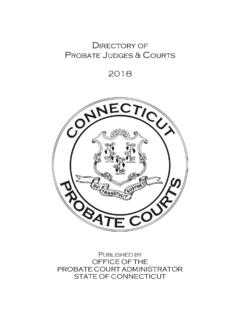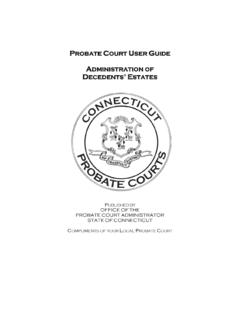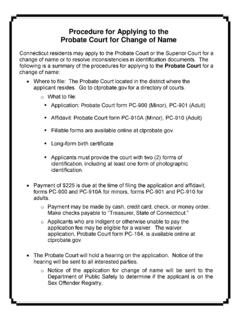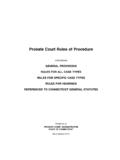Transcription of CONNECTICUT PROBATE COURTS
1 CONNECTICUT PROBATE COURTS 2016 - 2017 BIENNIAL REPORT PUBLISHED BY OFFICE OF THE PROBATE court ADMINISTRATOR STATE OF CONNECTICUT Biennial Report of the Office of the PROBATE court Administrator 2 016 - 2 017 Message from the PROBATE court Administrator Fiscal years 2015-16 and 2016-17 encompassed a period of extraordinary financial challenge for the PROBATE COURTS as state funding plummeted from 25% of our budget at the beginning of the biennium to 4% in the current fiscal year. Despite the fiscal stress, our commitment to the mission of helping CONNECTICUT families in a compassionate and cost-effective manner is stronger than ever. What stands out most about the past two years is the success of the PROBATE COURTS in finding ways to improve service in a time of diminishing resources.
2 Cuts to state funding, exacerbated by extreme volatility, was our single most significant challenge. We lost all state funding in 2016 (down from $11 million the prior year), then received $6 million in 2017, only to see another round of cuts drop us to $2 million in 2018. The result is a $ million operating deficit this year that will draw down the balance in the PROBATE court Administration Fund. To compound the problem, the state swept $ million from the PROBATE court Administration Fund to the state s General Fund in 2017, bringing the total amount of transfers from the PROBATE COURTS to the state since 2011 to $20 million. The PROBATE COURTS have been subsidizing the state in another important way: We bear the financial burden of $9 million per year in expenses associated with non-judicial state services that the state relies on us to provide.
3 Over 10% of the PROBATE court budget goes to the cost of paying for conservators for indigent seniors with dementia and individuals with mental illness. This is a vital state service, but one that in most states is the responsibility of an executive branch agency or publicly-funded nonprofit organization. Similarly, state law requires the PROBATE COURTS to distribute $2 million in grant funds for guardians caring for indigent children without providing the money to pay for the grants. Another $ million in annual expenditures is required to pay for attorneys for indigent parties to satisfy constitutional mandates. The cost of these three programs alone exceeds our general fund appropriation by $7 million this year.
4 1(in millions)The PROBATE COURTS have confronted these financial challenges head on by finding ways to do more with less. For example, we revamped the compensation guidelines for court -appointed conservators for indigent individuals to rein in the fastest-growing category in our budget. We also launched a labor-saving online billing system for attorneys and conservators that eliminated 25,000 paper invoices per year. Work is underway to implement an eFiling system that will similarly reduce paperwork and speed up processing times. Despite 61% growth in our mental health cases and a 15% increase in children s matters since 2011, we have held staffing levels steady. Financial constraints have not stopped us from leading the way in strengthening protections for the 20,000 CONNECTICUT residents who need conservators.
5 We secured a $30,000 grant to develop a comprehensive training program for new conservators. We are developing Standards of Practice that embody nationally recognized best practices and ethical guidelines for conservators. Our conservator accountability bill, enacted in 2017, permits random audits that will deter conservator misconduct. As the state continues to struggle with chronic budget problems, it bears emphasis that the PROBATE COURTS are an exceptionally cost-effective part of the state s safety net for children, the elderly and people with mental illness or intellectual disability. The key fact is that PROBATE COURTS empower families to help loved ones who are unable to care for themselves.
6 By helping families help themselves, the state saves hundreds of millions of dollars annually because the need for more expensive state services is vastly reduced. Three examples illustrate the point. PROBATE COURTS appoint relatives to serve as guardians for children whose parents cannot care for them due to incarceration, mental illness and addiction. This arrangement keeps more than 6,700 children out of the foster care system, saving the state $66 million per year. Similarly, about 900 individuals with mental illness live in the community with the assistance of a conservator, a far less expensive alternative to the $402 million in annual costs for inpatient treatment for that population at CONNECTICUT Valley Hospital.
7 And conservators who arrange in-home care for 2,660 indigent seniors save the state more than $206 million per year in Medicaid nursing home costs. In the pages that follow, you will learn more about the types of cases that PROBATE COURTS handle, statistics about our growing caseload and additional information about 2our finances. The report includes a directory of judges and COURTS . Regrettably, I must end this message with a warning: Restoration of funding for the PROBATE COURTS in the next biennium is nothing short of critical. We have managed draconian budget cuts since 2016 through belt-tightening and innovation, but the state s practice of using PROBATE court funds to subsidize state services will deplete the PROBATE court Administration Fund by June 30, 2019.
8 This means that the PROBATE COURTS will not be able to meet operating expenses in fiscal year 2019-20 unless General Fund support is returned to the 2015 funding level. The PROBATE COURTS represent an excellent value for the state by promoting family-centered solutions, at the regional level, that avoid far more costly state services. We hope that state leaders will recognize that the cost-effectiveness of the PROBATE COURTS warrants the modest state investment necessary to sustain the system. Paul J. Knierim PROBATE court Administrator 3 PROBATE court Jurisdiction The PROBATE COURTS are responsible for a wide range of cases involving the support and protection of children, seniors and individuals with mental illness and intellectual disability.
9 Children s Matters PROBATE COURTS hear several different types of cases involving children, including temporary custody and guardianship, termination of parental rights, visitation, adoption, emancipation and paternity. A large proportion of the guardianship matters in PROBATE COURTS involve parents who are unable to care for their children as a result of mental illness, addiction or incarceration. In the overwhelming majority of those cases, a family member is appointed as guardian to care for the child. Over 6,700 children are currently cared for by relatives as a result of this framework, at far less expense to the state than would be involved if the children were instead placed in the foster care system.
10 Another category of children s cases involves the management of funds on behalf of minors. CONNECTICUT law requires that any funds held for a child in excess of $10,000 must be managed by a guardian of the estate. PROBATE COURTS are responsible for the appointment and supervision of guardians for this purpose. In most cases, the parents are appointed as co-guardians. Conservatorships Conservatorship is a legal framework to manage the care and finances of an adult who is unable due to conditions such as dementia, mental illness, intellectual disability or severe physical illness. A PROBATE court makes the determination whether a person is incapable and appoints one or more persons to serve as conservator.









